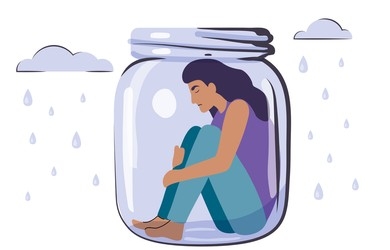Understanding Anxiety by Breaking the Myths of Pop Psychology
Author : Dr. Tulika | 16 Dec 2023

As individuals, we have a natural inclination to try and comprehend the world around us. We often play the role of "armchair psychologists," attempting to devise our own reasonable explanations for human behavior.
With the rise of technology and information overload, we are exposed to an overwhelming amount of data that can both inform and mislead us. This can result in flawed assumptions about human nature and even influence our daily decision-making processes.
Anxiety is a common mental health condition that affects millions of people worldwide. In recent years, pop psychology has become a popular source of information on how to manage anxiety. While some of the advice offered by pop psychology can be helpful, there are several myths associated with anxiety that can be counterproductive and even harmful.
Myth 1: Anxiety is just a state of mind
One of the most persistent myths about anxiety is that it is just a state of mind and that people who experience anxiety can simply "think their way out of it." This is not only untrue but also can be damaging. Anxiety is a complex condition that is influenced by various biological, psychological, and environmental factors. While certain techniques such as mindfulness and cognitive-behavioral therapy can help manage anxiety, they are not a cure-all. It is essential to seek professional help if you are experiencing severe or persistent anxiety.
Myth 2: Avoiding anxiety-provoking situations is the best approach
Many people believe that the best way to manage anxiety is to avoid situations that trigger it. While this may provide temporary relief, it can actually worsen anxiety over time. Avoiding anxiety-provoking situations can reinforce the belief that they are dangerous, leading to a vicious cycle of avoidance and anxiety. Instead, it is important to confront anxiety-provoking situations in a gradual and systematic way, with the help of a mental health professional if necessary.
Myth 3: Medication is the only solution for anxiety
While medication can be helpful for some people with anxiety, it is not the only solution. In fact, many people with anxiety find that a combination of medication and therapy is the most effective approach. Cognitive-behavioral therapy (CBT) is a particularly effective form of therapy for anxiety that can teach people skills to manage their anxiety in the long term. It is important to work with a mental health professional to determine the best approach for you.
Myth 4: Anxiety is a weakness or a character flaw
Anxiety is not a weakness or a character flaw. It is a common mental health condition that affects people from all walks of life. Many people with anxiety feel ashamed or embarrassed about their condition, which can make it even harder to seek help. It is essential to recognize that anxiety is a legitimate condition that can be managed with the right treatment.
Myth 5: You can "cure" anxiety
There is no "cure" for anxiety. However, with the right treatment, many people with anxiety are able to manage their symptoms effectively. It is important to recognize that anxiety is a chronic condition that may require ongoing treatment. However, with the right approach, people with anxiety can live fulfilling and meaningful lives.
While pop psychology can offer some helpful advice for managing anxiety, it is important to be aware of the myths associated with anxiety. By taking a realistic and evidence-based approach, we can make the most of the benefits of pop psychology and avoid its pitfalls. It is important to seek professional help if you are experiencing severe or persistent anxiety, and to remember that anxiety is a common condition that can be managed with the right treatment. By speaking out and seeking help, we can break down the stigma associated with anxiety and help others who may be struggling with this challenging condition.






